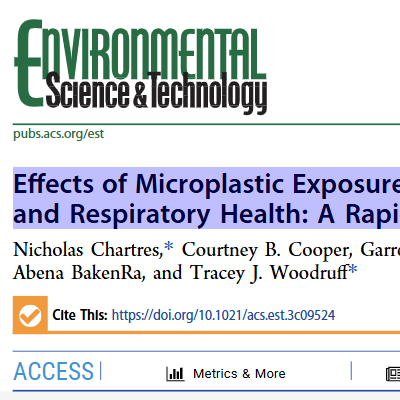
Effects of Microplastic Exposure on Human Digestive, Reproductive, and Respiratory Health: A Rapid Systematic Review
We concluded that exposure to microplastics is “unclassifiable” for birth outcomes and gestational age in humans on the basis of the “low” and “very low” quality of the evidence. We concluded that microplastics are “suspected” to harm human reproductive, digestive, and respiratory health, with a suggested link to colon and lung cancer. Future research on microplastics should investigate additional health outcomes impacted by microplastic exposure and identify strategies to reduce exposure.

Association of mixed exposure to microplastics with sperm dysfunction: a multi-site study in China
Our findings highlight the potential reproductive health risks posed by microplastic contamination, particularly PTFE, a non-stick pan coating material, and raise concerns about the potential of urine testing as an indicator of male reproductive microplastic exposure. Future research is warranted to further elucidate the mechanisms underlying the adverse effects of microplastics on male fertility and cross-generational effects.

Microplastic presence in dog and human testis and its potential association with sperm count and weights of testis and epididymis
Our study revealed the presence of microplastics in all canine and human testes, with significant inter-individual variability. Mean total microplastic levels were 122.63 µg/g in dogs and 328.44 µg/g in humans. Both humans and canines exhibit relatively similar proportions of the major polymer types, with PE being dominant. Furthermore, a negative correlation between specific polymers such as PVC and PET and the normalized weight of the testis was observed. These findings highlight the pervasive presence of microplastics in the male reproductive system in both canine and human testes, with potential consequences on male fertility.

Microplastics Occurrence, Health Effects, and Mitigation Policies: An Evidence Review for the California State Legislature
This report responds to a joint request from the California Senate Committee on Environmental Quality and the Assembly Committee on Natural Resources for evidence concerning human health effects of microplastics and public policies related to microplastics prevention and mitigation.
Research was conducted by the California State Policy Evidence Consortium (CalSPEC), anindependent program administered through the University of California Center Sacramento (UCCS) and composed of faculty, staff, and graduate student researchers across UC campuses who evaluate evidence to inform public policy deliberations.

